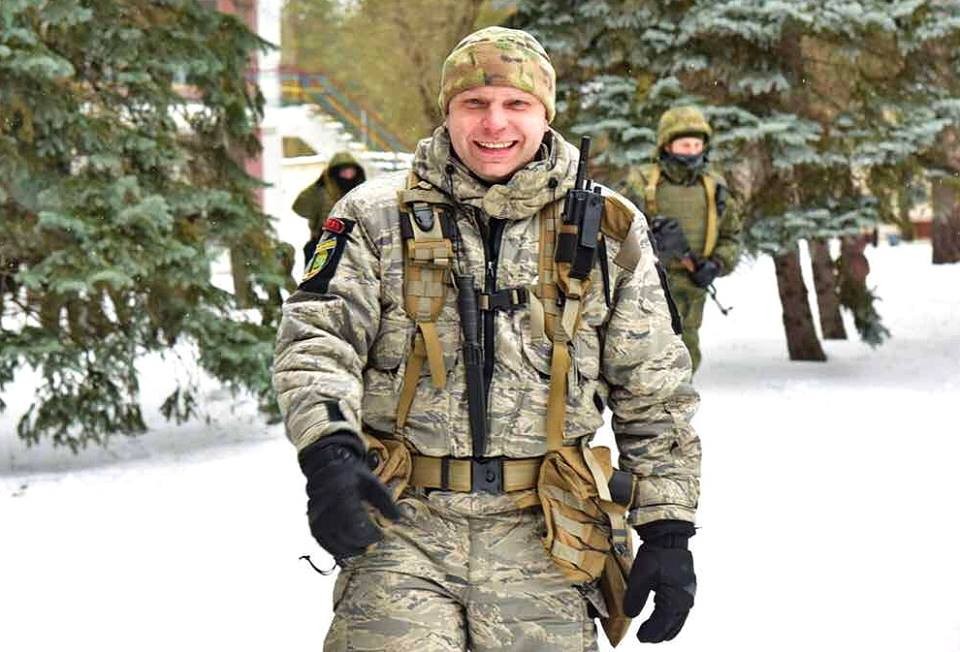More evidence has emerged that a Ukrainian police official had links to Russian-backed separatists, triggering a public outcry.
Several videos published over the past week show a person who resembles Yury Goluban, the commander of a special forces unit at the National Police’s Donetsk Oblast branch, in the company of Kremlin-backed fighters.
The case is the latest in a string of allegations that incumbent top officials have links to Russian-backed separatists. In addition, numerous officials who served under disgraced former President Viktor Yanukovych’s regime and cracked down on EuroMaidan protesters in 2013 to 2014 have kept their jobs.
Critics also see the Goluban case as more proof that the touted police reform has utterly failed.
Separatist links
The initial accusations against Goluban were made by pro-Russian separatist Oleksandr Khodakovsky, who said on March 15 that Goluban had fought for his separatist Vostok battalion.
Goluban is a former subordinate of Khodakovsky when the latter headed the Alfa special forces unit at the Security Service of Ukraine’s Donetsk branch before the 2013-2014 EuroMaidan Revolution.
“The colonel who spoke broken Ukrainian from the Verkhovna Rada’s tribune is none other than my former subordinate, who left service (at the SBU) long before the war to get a well-paid business job,” Khodakovsky wrote on the Vkontatke social network. “When the (war) began, this person joined (the separatist) militia and even took part in the Battle of Karlivka in May 2014 against Semen Semenchenko’s battalion.”
Goluban came into the spotlight when he and several other police officers entered the Verkhovna Rada in violation of parliamentary procedure on March 15 building to criticize activists blockading trade with Russian-occupied areas.
He denies having fought for Russian-separatist forces.
“The video features a person who resembles me,” Goluban said on April 6. “I think it might be me. But the video was definitely tampered with.”
He said the video with him in an Alfa uniform could have been taken from archived footage of Alfa’s Donetsk unit and inserted into a video with Russian-backed separatists.
Goluban admitted on March 17 that he had met with Khodakovsky three times when the war with Russia started in April to May 2014.
Minister’s response
Interior Minister Avakov said on April 8 that the Interior Ministry, the Prosecutor General’s Office and the Security Service of Ukraine (SBU) would investigate the accusations made against Goluban.
Goluban has said he is ready to undergo a polygraph test and give all the necessary information, Avakov added.
At the same time, Avakov lashed out at Goluban’s critics, including Samopomich lawmakers Yegor Sobolev and Semen Semenchenko, and accused them of coordinating their accusations with the Kremlin and Russian-backed separatists.
The Interior Ministry said on March 13 that Goluban had received a medal from President Petro Poroshenko for his outstanding service.

Police officer Yury Goluban
Other officials
Goluban is not the only senior police official to face accusations of colluding with the enemy.
Goluban’s boss, Vyacheslav Abroskin – a deputy head of the National Police and chief of Donetsk Oblast police – allegedly tried to serve the Russian occupation authorities as a police official in Crimea in 2014 before moving to mainland Ukraine, according to Sevastopol-based media. However, he denies this.
Abroskin on March 16 publicly supported the proposal by People’s Front lawmaker Yevgeny Deidei to beat Batkivshchyna lawmaker Igor Lutsenko with a baseball bat for exposing Goluban.
According to an alleged Security Service of Ukraine (SBU) document published on March 12 by Anton Shevtsov, a former Vinnytsa Oblast police chief, Shevstov has received intelligence information from Abroskin, who is mentioned in the document as an alleged liaison of Crimean separatist Sergei Aksyonov.
Shevtsov said the document was part of a treason case against him but dismissed it as “nonsense.” He was fired and arrested last year after evidence emerged of his pro-Russian leanings.
Other politicians close to President Poroshenko have also been accused of having links to Kremlin-backed separatists.
Prominent separatist Igor Bezler said on April 3 that he used to be in charge of security for Artur Gerasimov, now the head of the Poroshenko Bloc’s faction in parliament, in 2012.
This information was confirmed by Volodymyr Poddubny, a former political associate of Gerasimov, though Gerasimov says that Bezler had only worked as a driver for him for a week.
Gerasimov also has ties to Sergiy Shakhov, a controversial ex-ally of Yanukovych, and Oleh Nedava, a Poroshenko Bloc lawmaker and close associate of Yury Ivanyushchenko – another confidante of Yanukovych.
Meanwhile, SBU Deputy Chief Vitaly Malikov, a former lawmaker from ex-President Viktor Yanukovych’s Party of Regions on Sevastopol City Council, voted to call on Yanukovych to crack down on the EuroMaidan protesters in January 2014.
Alexei Kiselyov, an ex-member of Sevastopol City Council, has accused Malikov of backing pro-Kremlin separatist Alexei Chaly and the sham referendum on Crimea’s annexation held in 2014, which Malikov denies.
Another top official, Vasyl Burba, was appointed by Poroshenko as chief of military intelligence last year and had previously worked at the SBU. According to a document published by Zakarpattia Oblast Governor Gennady Moskal, Burba participated in the crackdown on EuroMaidan demonstrators on Feb. 18-20, 2014, which led to the murders of about 100 protesters. Burba was not available for comment.
Another expose came as Andriy Biletsky, a lawmaker and leader of the Azov nationalist regiment, in January accused the National Guard’s leadership of large-scale corruption and covering up for officials with pro-Russian leanings. The National Guard said it would investigate the claims.
